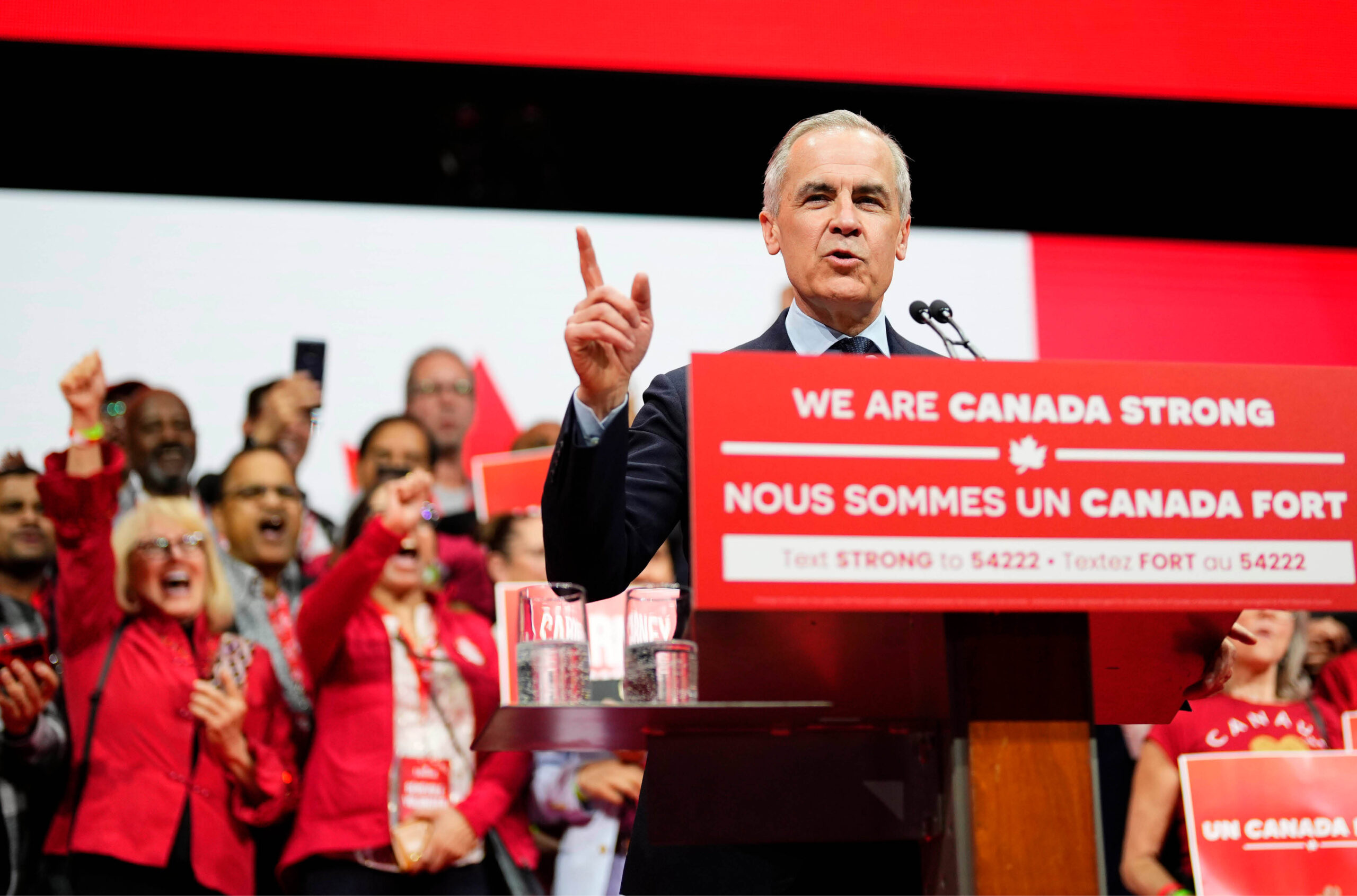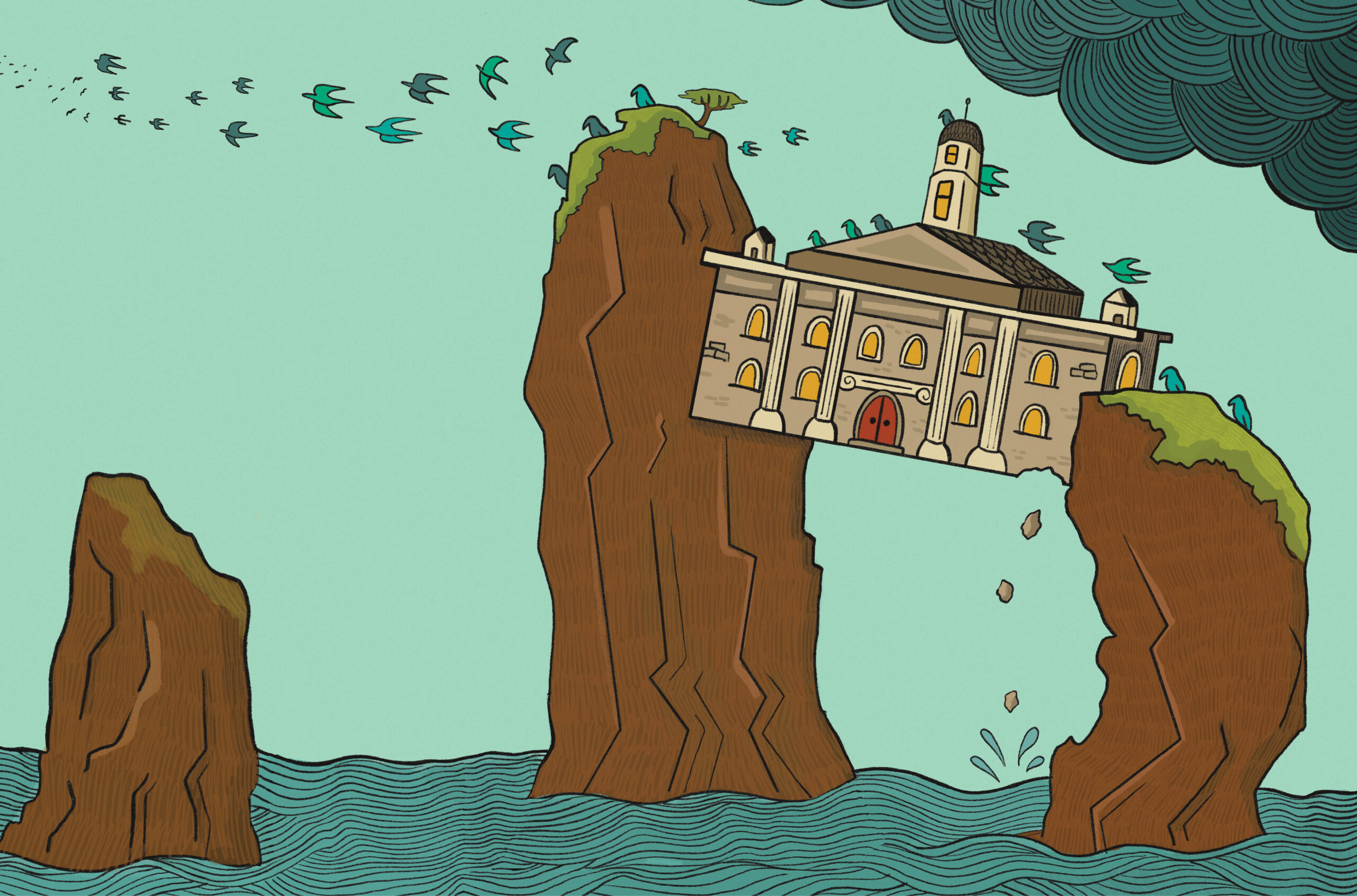The growing estrangement between universities and society
The notion that the future of Canada lies in, or through, its universities is an increasingly hard sell.

Hi, I’m new here. Perhaps I should introduce myself.
Can we divide the world into people who never went to university, people who arrived at university and never left, and people who went for a while? I’m in the last group. I’m aware that many of you are in the second group. Yes, I feel imposter syndrome writing for you.
I graduated from Western University in 1989 with a bachelor’s in political science. It took a while, because first I had to flunk second year chemistry, a task I performed with some enthusiasm. Later, it bugged me when people called what I was studying political “science.” I thought: I’ve seen science, and this isn’t it. I never stopped thinking about university, but only after 2000 did higher education as a policy file enter my portfolio of journalistic interests. In 2000 Jean Chrétien ran his third campaign as the leader of the federal Liberal party. He had two main opponents: Stockwell Day, the youthful leader of the opposition Canadian Alliance; and Paul Martin, the charming leader of every Liberal who didn’t like Chrétien. Chrétien called the election early, to take both men by surprise. He held many of his campaign events on university campuses. It was a classic contrast play. Stockwell Day is the past, he was saying in effect. He doesn’t own a library card. I’m the future. I am surrounded by people in lab coats. In the end, Chrétien won an increased majority in the House of Commons. It might have been his greatest political triumph.
But it was more than talk and tactics. Chrétien had already been investing heavily in university research before the election, and he followed through after, with rapid growth in budgets for granting councils, scholarships and research chairs. Much of Canada’s research effort today can trace its roots to programs that were introduced during the Chrétien era.
In 2003 I began working for Maclean’s, which had a popular university rankings issue and devoted resources year-round to covering higher education. Universities weren’t my beat, but Maclean’s was happy to publish anything I wrote about the sector.
It was an exciting time to be writing about universities. At first.
Chrétien was far from the only politician with his eye on higher ed. There was widespread support in Canadian society for a strong university sector. All kinds of governments hitched their wagons to this vision. In 2005 Indira Samarasekera agreed to become president of the University of Alberta because Ralph Klein told her he had a long-term plan for investment in Alberta universities. In 2007 the British Columbia government’s Campus2020 plan set out to make B.C. “the best-educated, most literate jurisdiction on the continent” by 2020. Quebec’s finance minister wanted to make Montreal “a global crossroads for photonics.”
In 2001 Tom Courchene, the great Queen’s University economist, delivered a kind of manifesto for the era when he published A State of Minds: Toward a Human Capital Future for Canadians. The book asked: “What happens when the world changes in ways that make Canada’s physical capital, natural resources, and geography – once the ultimate competitive advantages – less important than knowledge, information, technological know-how and human capital? What happens to Canadians?”
The surprise answer is, we’re not likely to find out anytime soon. Canada is probably further from that goal today than in 2001. And we’re moving in the wrong direction.
The momentum faded so slowly it took years to notice. Alberta cut its university budgets deeply in 2013. They haven’t really recovered. In 2007 Stephen Harper created a Science, Technology and Innovation Council, with deputy ministers, university presidents, CEOs and a secretariat to produce biennial State of the Nation reports comparing Canada’s science and technology performance against other countries. Increasingly, the reports said Canada was falling behind. So in 2016 Justin Trudeau shut the STIC Council down. No more bad news!
The bad news for university budgets keeps getting worse. Government grants are frozen or declining. Tuition fees for domestic students are often cut or capped, in a gesture of misguided populism. Some universities respond by letting enrolment skyrocket, especially enrolment by international students, who can pay higher fees. Not a perfect solution. And lately, no kind of solution at all, because policymakers have begun to curtail that option too.
But the bad news is not only budgetary. It’s cultural. The notion that the future of Canada lies in, or through, its universities is an increasingly hard sell. Ask parents about their university-age children and you’re likely to hear them talk about four undergraduate years as a questionable indulgence. The kid will probably need vocational training afterward, a lot of parents say mournfully, to teach them something useful. People have only the vaguest idea what happens in universities, but they’re pretty sure they don’t like it.
When I wrote about the budget crunch at Queen’s last year, a lot of the comments from readers were celebratory. Let it rot, some said. They see nothing useful going on in universities – and they’re pretty sure universities don’t see anything useful going on in Canada.
I’m talking about something similar to what Larry Summers, the former Harvard president, meant when he spoke in February on Yascha Mounk’s podcast The Good Fight about an “enormous estrangement between universities and the broader society.” The Ivy League universities, Dr. Summers said, “have thumbed their nose at what is by far their largest donor” —the U.S. federal government.
Now, it’s great for academics to have a cultural critique about the broader society. It’s hard to imagine a university worth the name that could find no home for that spirit of critique. But monolithic disdain, endorsed by taboo, isn’t a critique. And disdain can be reciprocated, by families and by governments that might otherwise be expected to send children, funding and esteem to institutions of higher education. In the U.S., four Ivy League universities have lost their presidents to resignation in the last year. In Canada, the inevitably wrenching debates over pro-Palestinian encampments might have been easier to weather if Canadians had a stronger pre-existing sense that useful things are happening on campuses besides the theatre of confrontation.
How far can this mutual estrangement between what we used to call Town and Gown go? In July Michelle Rempel Garner, the Conservative MP for Calgary Nose Hill, wrote an astonishing post on her popular Substack newsletter, with the headline, “Major screw-ups at universities should raise questions about their research funding eligibility.” I don’t endorse her argument, but given the company she keeps – a large parliamentary caucus that seems likely to grow in a year or so – it’s probably worth some attention and concern.
“Some Canadian universities have demonstrated management paralysis when faced with no-brainer decisions, and seem incapable of managing basic, foreseeable risk,” Ms. Rempel Garner writes. Exhibit A is the encampments, which she didn’t like, but she has a long list of other grievances. The easiest way to “force” universities “to do better” is to “review the eligibility requirements for the receipt of federal research funds to ensure strong university governance.”
Perhaps, like me, you’re inclined to point out flaws in this plan. Chief among them is the fact that the grants for research go to different people than the ones who decide how to handle a protest. If someday a protest goes poorly at the University of Calgary, for instance, I’m not sure a penalty should properly be lodged against somebody researching childhood cancer at the Alberta Children’s Hospital Research Institute.
In fact, I would say the proposed remedy is terribly misplaced. But my opinion probably matters less these days to Ms. Rempel Garner than that of Pierre Poilievre, her party’s leader. And in 2022, while he was running for the leadership, Poilievre promised to make federal research funding conditional on universities pledging to uphold Charter free speech guarantees.
A government that decided to make it harder for universities to obtain funding would, these days, have plenty of company. The enormous estrangement Dr. Summers described might yet have room to grow. Governments make decisions in the context of public opinion, which means any large institution is always in a battle for the esteem of the population. And for Canadian universities, that battle has already been going the wrong way. For years.
Featured Jobs
- Canada Excellence Research Chair in Forest Biodiversity Conservation (Full Professor)University of New Brunswick
- Canada Excellence Research Chair in Energy TransitionsUniversité du Québec à Trois-Rivières (UQTR)
- Education - Assistant Professor (Distance Education)University of Toronto
- Canadian Politics - Assistant ProfessorUniversity of Toronto
- Business – Lecturer or Assistant Professor, 2-year term (Strategic Management) McMaster University











Post a comment
University Affairs moderates all comments according to the following guidelines. If approved, comments generally appear within one business day. We may republish particularly insightful remarks in our print edition or elsewhere.
6 Comments
Welcome to University Affairs. Your comments are troubling for those of us who support higher education – but also very necessary to read., This is an important issue for anyone who cares about our country’s future. I speak as a former vice-president of Universities Canada and former publisher of University Affairs. I still work with universities across the country as a consultant. Your column is a very welcome addition to the magazine.
Yet in a lot of ways, consistent public investment in Universities is the solution to estrangement. The financial gymnastics we need to play just to get basic, sometimes relatively small scale research funded is astonishing. To get money, we need to luck out with highly-compettive government grants or become pseudo-consultants for corporations/institutions, providing an academic rubber-stamp of approval in support of their agenda and ideas.
In the end, when you are constantly vying for funding to perform your basic research mandate and using your research skills to often serve the narrow interests of external funders. This prevents researchers from engaging with community and societal needs, and with actually connecting with that community. Under those circumstances, it is very, very difficult to not be estranged from the broader community and society.
Louis, I agree with you, and would also argue that the entrenchment of “publish or perish” mentality in academic advancement has also hindered our ability to play the active and collaborative role in society that is possible. When the only route to tenure is top tier journal publications, faculty often take on engaged research and learning at the risk of their own professional disadvantage.
We recently conducted an evaluation of public engagement activity (that is, collaborations between the university and the public that are connected to the academic mission) at my own university and the results were very clear: students, faculty, and staff want to be doing more work with the public on issues that matter…the most cited problem is that adequate recognition for this valid and important scholarly activity is still not consistent, but we also heard about a range of other challenges, many of which could be solved relatively easily.
Despite the challenges, this work is being undertaken by dedicated students and faculty (with the support of boundary spanning staff) across Canada. In fact, many cite intrinsic motivation: they want to give back to the world, or they see it as a moral/ethical responsibility.
Publicly engaged research and teaching are an easy sell to the public, but for some reason, most institutions haven’t really emphasized this potential area of light, within strategic decision-making or in university positioning. There is plenty of room to move ahead here, and I believe it could play a significant role in helping to improve the reputation of “the university” and of individual, regionally relevant institutions across the country.
Universities in Canada should adopt the University of Chicago policy of not taking political or activist positions. Academics, yes, speak up, of course; Administrations, NO!
University Administrations’ activism is not only estranging funders but also offending society at large.
Couldn’t agree more Ken!
I’m not sure what to take from this article. Much of it is anecdotal. For instance, the author states the following: “Ask parents about their university-age children and you’re likely to hear them talk about four undergraduate years as a questionable indulgence. The kid will probably need vocational training afterward, a lot of parents say mournfully, to teach them something useful. People have only the vaguest idea what happens in universities, but they’re pretty sure they don’t like it.”
This is pure conjecture. Without an attitudinal survey, how is anyone to know if parents view an undergraduate degree as a “questionable indulgence” or if they “say mournfully” that a college degree is also needed? And again, without research, how do we know if large swaths of people are “pretty sure they don’t like it [what happens in university]”? Did these people even attend a university? If no, how do they know they wouldn’t like it if they have never attended a single class?
If you are going to discuss people’s attitudes towards getting a degree, it would be nice to present scientific studies to understand what they think rather than read guesswork by the author. Using scientific studies to prove a claim is the first thing you learn as an undergraduate.